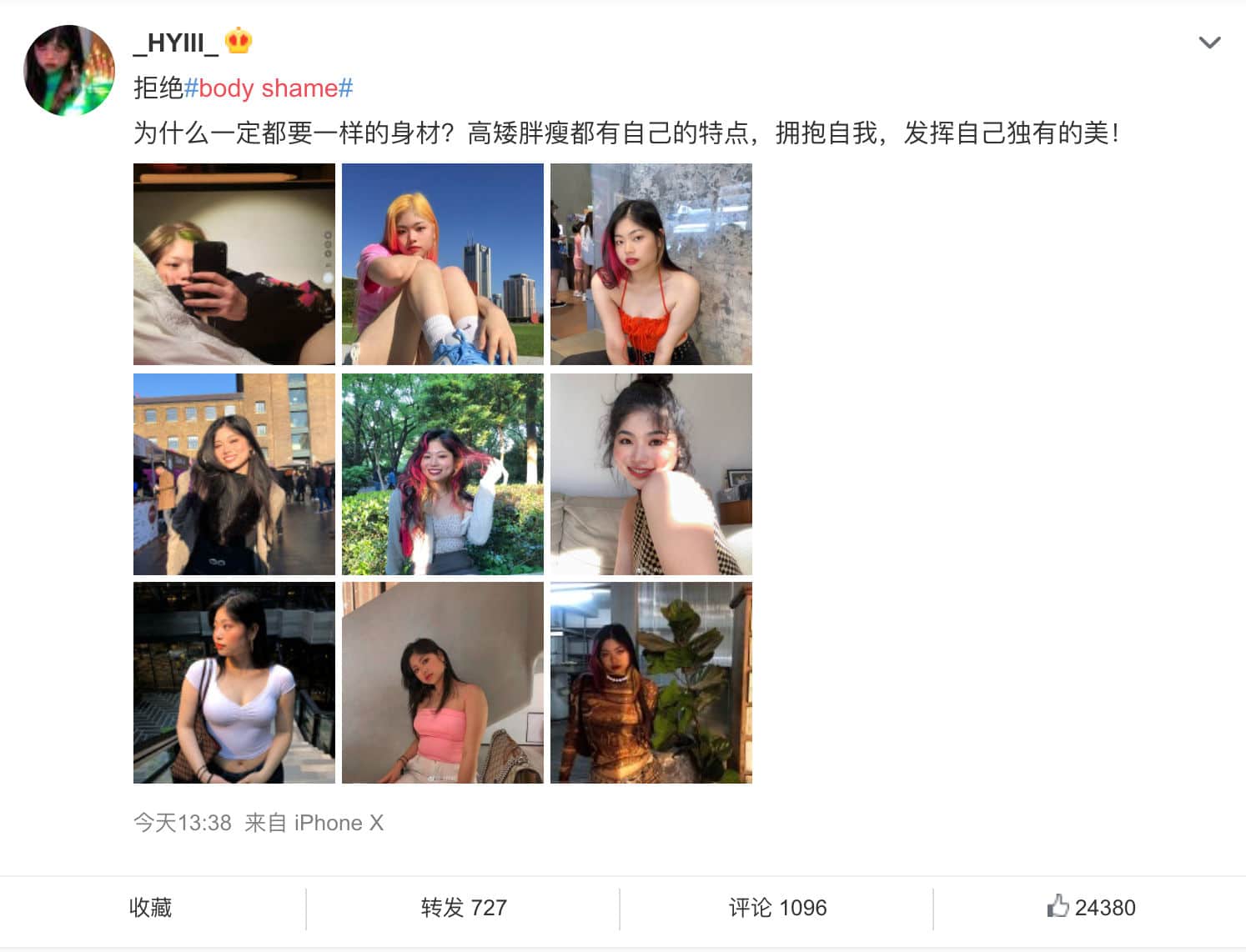China Celebs
Chinese Social Media Users Stand up Against Body Shaming
Published
5 years agoon

Recent photos of famous actress Gong Li that showed her curvier figure have gone viral on Sina Weibo, receiving over 850 million clicks. With Gong Li’s weight gain becoming all the talk on Weibo, the public’s focus on her appearance has sparked an online wave of body positivity posts, with web users rejecting the all-too-common phenomenon of body shaming on Chinese social media.
First, there was the ‘A4 Waist‘ hype, then there was the ‘iPhone6 Legs‘ trend, the ‘belly button backhand,’ and the online challenge of putting coins in your collarbone to show off how thin you are (锁骨放硬币). Over the past five years, China has seen multiple social media trends that propagated a thin figure as the ruling beauty standard.
But now a different kind of trend is hitting Weibo’s hotlists: one that rejects body shaming and promotes the acceptance of a greater diversity in body sizes and shapes in China.
On August 26, Weibo user @_HYIII_ from Shanghai posted several pictures, writing:
“Reject body shaming! Why should we all have the same figure? Tall or short, thin or fat, all have their own characteristics. Embrace yourself, and show off your own unique beauty!”

The post was soon shared over 900 times, receiving more than 32,000 likes, with the “body shame” phrase soon reaching the top keyword trending list of Sina Weibo.
Gong Li Weight Gain
The body positivity post by ‘_HYIII_’ is going viral on the same day that the apparent weight gain of Chinese actress Gong Li (巩俐) is attracting major attention on Chinese social media platforms such as Weibo and Douyin.
The 54-year-old actress, who is known for starring in famous movies such as Farewell My Concubine, To Live, and Memoirs of a Geisha, was spotted taking a walk with her husband in France on August 24. The photos went viral, with media outlets such as Sina Entertainment noting how Gong Li had become “much rounder” and had put on some “happy fat” (幸福肥).

By now, the hashtag page “Gong Li’s Figure” (#巩俐身材#) has received more than 850 million (!) views on Weibo, with thousands of people commenting on the appearance of the actress. In the comment sections, there were many who lashed out against the focus on Gong Li’s weight gain.
“She just has a regular female body shape. Stop using ‘white / skinny / young’ as the main beauty standard to assess other people,” one commenter said, with another person writing: “Why do you all keep focusing on her figure, did she steal your rice and eat it?!”
“Why do you all keep focusing on her figure, did she steal your rice and eat it?”
Some people suggested that the COVID19 pandemic might have to do with Gong Li’s weight gain, with others writing: “If she is healthy is what matters, skinny or fat is not the way to assess her beauty.”

What stands out from the discussions flooding social media at this time, is that a majority of web users seem to be fed up with the fact that a skinny body is the common standard of women’s beauty in China today – and that accomplished and talented women such as Gong Li are still judged by the size of their waist.
Say No to Body Shaming
In light of the controversy surrounding Gong Li’s recent photos and the following discussions, posts on ‘body shaming’ (身材羞辱) are now flooding Weibo, with many Weibo users calling on people to “reject body shaming” (拒绝#body shame#) and to stop imposing strict beauty standards upon Chinese women.
The pressure to be thin, whether it comes from the media or from others within one’s social circle, is very real and can seriously affect one’s self-esteem. Various studies have found an association between body dissatisfaction and social pressure to be thin and body shaming in Chinese adolescents and young adults (Yan et al 2018).
The main message in this recent Weibo grassroots campaign against body shaming, is that there are many ways in which women can be beautiful and that their beauty should not be merely defined by limited views on the ideal weight, height, or skin color.
Over the past decades, women’s beauty ideals have undergone drastic changes in China, where there has been a traditional preference for “round faces” and “plump bodies.” In today’s society, thin bodies, sharp faces, and a pointy chin are usually regarded as the standard of female ideal beauty (Jung 2018, 68). China’s most popular photo apps, such as Meitu or Pitu, often also include features to make one’s face pointier or one’s legs more skinny.
This is not the first time Weibo sees a growing trend of women opposing strict beauty standards. Although the word ‘body shaming’ has not often been included in previous trends, there have been major trends of women opposing popular skinny challenges and even one social media campaign in which young women showed their hairy armpits to trigger discussions on China’s female aesthetics.
Especially in times of a pandemic, many netizens now stress the importance of health: “Skinny or fat, it really doesn’t matter how much you weigh, as long as you’re healthy – that’s what counts.”
Also read:
- Anorexia in China – Same, But Different
- Binging and Purging as Online Trend: From China’s “Big Stomach Stars” to “Vomit Bars”
- Move Over ‘A4 Waist’, Here Comes the ‘iPhone6 Legs’ Hype – Growing Concerns Over China’s Online Skinny Trends
By Manya Koetse
Follow @WhatsOnWeibo
References
Jung, Jaehee. 2018. “Young Women’s Perceptions of Traditional and Contemporary Female Beauty Ideals in China.” Family and Consumer Sciences Research Journal 47 (1): 56-72.
Yan, Hanyi ; Wu, Yingru ; Oniffrey, Theresa ; Brinkley, Jason ; Zhang, Rui ; Zhang, Xinge ; Wang, Yueqiao ; Chen, Guoxun ; Li, Rui ; Moore, Justin. 2018. “Body Weight Misperception and Its Association with Unhealthy Eating Behaviors among Adolescents in China.” International Journal of Environmental Research and Public Health 15 (5): 936.
Spotted a mistake or want to add something? Please let us know in comments below or email us. First-time commenters, please be patient – we will have to manually approve your comment before it appears.
©2020 Whatsonweibo. All rights reserved. Do not reproduce our content without permission – you can contact us at info@whatsonweibo.com.
Manya is the founder and editor-in-chief of What's on Weibo, offering independent analysis of social trends, online media, and digital culture in China for over a decade. Subscribe to gain access to content, including the Weibo Watch newsletter, which provides deeper insights into the China trends that matter. More about Manya at manyakoetse.com or follow on X.

China Celebs
Explaining China’s Collective Grief Over the Death of ‘Big S’ Barbie Hsu
Published
2 months agoon
February 11, 2025
FROM THE WEIBO WATCH PREMIUM NEWSLETTER
The death of Barbie Hsu (徐熙媛) has sent shockwaves across Chinese social media. Her unexpected passing, along with the circumstances surrounding it, quickly became the most talked-about topic on Chinese social media in early February.
Barbie Hsu (1976) is generally known as “Big S” (大S) in China. The Taiwanese actress, singer, and TV host is one of those people who just always seemed to be around. She wasn’t just frequently a trending topic on Chinese social media but was also a household name, together with her sister, in the world of China’s pop culture and entertainment.
Most people will know Hsu because of the famous 2001 Taiwanese series Meteor Garden (流星花园), in which she played the award-winning role of female protagonist Shan Cai (杉菜). That role also made her famous outside of China, as the series became popular in South Korea, Singapore, the Philippines, Malaysia, and beyond.

But her career had taken off years before that success. Together with her sister Dee Hsu (徐熙娣, “Little S” 小S), she formed the pop duo SOS (later “ASOS”) in the 1990s. The name stood for Sisters Of Shu (alternative spelling of Hsu), and was the source of their “Big S” and “Little S” nicknames.
She later made a switch to movies and was a TV host and a singer. While her sister Dee Shu gained recognition as the humorous host of the long-running talk show Kangxi Coming (康熙來了), Barbie Hsu also served as a stand-in host or guest on that show, as well as many others.
Besides her professional life, it was often Hsu’s private life that brought her to the top of Weibo’s trending charts. Her marriage to mainland Chinese businessman Wang Xiaofei (汪小菲)—with whom she had a daughter and a son in 2014 and 2016—frequently made headlines. The couple even participated in a reality show, and Hsu’s private life began to take on Kardashian-like proportions. The two were rumored to bicker over money issues after Wang opened S Hotel, a boutique hotel in Taipei designed by Philippe Starck and named after his wife.
Following their separation in 2021, much of the messy divorce drama between the two played out on Weibo and became the biggest celebrity topic of 2022. The ongoing drama started when Hsu accused her ex-husband of failing to pay alimony, with the accumulated amount allegedly exceeding NT$5 million (US$160,000). Wang Xiaofei then publicly and angrily responded to Hsu’s accusations with multiple emotional posts on his Weibo account, where he had over seven million followers. Everyone and everything got dragged into the drama, from Wang’s mother Zhang Lan (张兰) to Hsu’s new partner, South Korean musician DJ Koo Jun-Yup.
Hsu’s health and frail body also made headlines at times. In 2018, she was hospitalized after a epileptic fit brought on by a cold. Besides epilepsy, Hsu suffered from a chronic heart condition (mitral valve prolapse). In late January of this year, she traveled to Japan for the Chinese New Year and caught influenza during her trip. Her health deteriorated rapidly within just five days, and she passed away on February 2nd from influenza-induced pneumonia. She was only 48 years old.
The news of her death has had a massive impact on Chinese social media. On Weibo, the hashtag ‘Big S has Passed Away’ (#大S去世#) has garnered over 3.3 billion views within six days.
While the initial reaction was one of shock over her sudden passing, various other aspects of her life, legacy, and the circumstances surrounding her death have sparked broader discussions, turning it into a widely debated topic—one that many find particularly heartbreaking for various reasons.
➡️ As Barbie Hsu has been in the public eye for decades, many grew up watching her and following her for over 25 years. Even those who were not particularly fans of Hsu are now coming forward to express collective grief and nostalgia over her passing—like losing a piece of their younger self.
Similarly, the passing of the beloved pop star Coco Lee in 2023 also made people collectively reflect on a bygone era of Chinese pop culture that defined the youth of millions. Like Lee, Barbie Hsu was a big part of early 2000s Chinese pop culture. Some people admit that Hsu’s passing has left them crying for days.
Many netizens expressed grief not just for her death but also for the fading of a time when Taiwanese idol dramas and their own carefree youth were at their peak.
“I was in fifth grade when Meteor Garden aired, and I remember running home after school to watch it. I saved up 60 kuai ($8.6) to buy the DVD,” one Weibo user shared. “Such a lively and bold woman has suddenly disappeared, an entire generation’s youth and memories,” another person wrote.
➡️ The death of Barbie Hsu and the sudden, rapid progression of her illness—from influenza to fatal pneumonia—has raised awareness this week about the potential dangers of the flu. It has also triggered some public anxiety about the latest outbreak in Japan, which is experiencing its largest flu surge in 25 years, and how influenza is treated in the country.
Many are questioning why such a wealthy, well-known celebrity couldn’t receive effective treatment in Japan, a country generally perceived to have an advanced healthcare system. While it remains unclear how her condition deteriorated so quickly—especially since she allegedly appeared well and energetic at a January 25 banquet—it may not have helped that Hsu was in Hakone, an area without major hospitals like those in Kyoto or Tokyo. According to various media reports, Hsu sought medical assistance in the days leading up to her death but was not admitted to any hospital during that time.
In light of this incident, others also share their struggles with healthcare in Japan, claiming that costs and language barriers previously prevented them from receiving proper care while traveling there and falling ill.
➡️ Perhaps the strongest online response to Barbie Hsu’s death is related to gender dynamics, touching on topics such as feminism, misogyny, and patriarchy.
Many netizens argue that, despite always sacrificing herself for others, Hsu did not receive the love and care she deserved. The aftermath of her divorce from Wang Xiaofei left permanent scars on the superstar. Throughout her long career, Hsu consistently supported her family and became a family pillar and breadwinner. While navigating the harsh environment of the entertainment industry, she pushed herself and her body to the limits. Despite her efforts, she was always judged for her looks and body weight, and was later bullied and humiliated by her ex-husband.
A recurring sentiment among commenters, especially on Xiaohongshu, is that women, both in public and private life, are often overburdened while receiving little in return. Many pointed out that if someone as beautiful and successful as “Big S” could suffer under the burden of caregiving and the toxicity of the men around her, what hope is there for ordinary women?
At the same time, Hsu is also praised as an example of self-empowerment for all she accomplished, and as a reminder that taking good care of yourself is more important than seeking the validation of others.
➡️ On Weibo, the people expressing their grief over Hsu’s passing are also reflecting on the fragility of life. Notably, Hsu’s WeChat tag at the time of her death read, “Death is inevitable” (“死亡是必然的”).
In a past interview, she said: “Death is not scary. What’s scary is not being able to die. Aging is not scary. What’s scary is living forever.” (“死不可怕。可怕的是死不了。老不可怕。可怕的是长生不老。”)
By Manya Koetse
(follow on X, LinkedIn, or Instagram)
Spotted a mistake or want to add something? Please let us know in comments below or email us. First-time commenters, please be patient – we will have to manually approve your comment before it appears.
©2025 Whatsonweibo. All rights reserved. Do not reproduce our content without permission – you can contact us at info@whatsonweibo.com.
China Arts & Entertainment
Controversial Wanghong Livestreamers Are Becoming a Weibo Staple in China
‘Wanghong’ was a mark of online fame; now, it’s increasingly tied to controversy and scandal.
Published
6 months agoon
October 27, 2024
As livestreaming continues to gain popularity in China, so do the controversies surrounding the industry. Negative headlines involving high-profile livestreamers, as well as aspiring influencers hoping to make it big, frequently dominate Weibo’s trending topics.
These headlines usually revolve around China’s so-called wǎnghóng (网红) influencers. Wanghong is a shortened form of the phrase “internet celebrity” (wǎngluò hóngrén 网络红人). The term doesn’t just refer to internet personalities but also captures the viral nature of their influence—describing content or trends that gain rapid online attention and spread widely across social media.
Recently, an incident sparked debate over China’s wanghong livestreamers, focusing on Xiaohuxing (@小虎行), a streamer with around 60,000 followers on Douyin, who primarily posts evaluations of civil aviation services in China.

Xiaohuxing (@小虎行)
On October 15, 2024, at Shenzhen Bao’an International Airport, Xiaohuxing confronted a volunteer at the automated check-in counter, insisting she remove her mask while livestreaming the entire encounter. He was heard demanding, “What gives you the right to wear a mask? What gives you the right not to take it off?” and even attempted to forcibly remove her mask, challenging her to call the police.

During the livestream, the livestreamer confronted the woman on the right for wearing a facemask.
He also argued with a male traveler who tried to intervene. In the end, the airport’s security officers detained him. Shortly after the incident, a video of the livestream went viral on Weibo under various hashtags (e.g. #网红小虎行机场强迫志愿者摘口罩#) and attracted millions of views. The following day, Xiaohuxing’s Douyin account was banned, and all his videos were removed. The Shenzhen Public Security Bureau later announced that the account’s owner, identified as Wang, had been placed in administrative detention.
On October 13, just days before, another livestreaming controversy erupted at Guangzhou Baiyun International Airport. Malatang (@麻辣烫), a popular Douyin streamer with over a million followers, secretly filmed a young couple kissing and mocked them, continuing to film while passing through security—an area where filming is prohibited.
Her livestream quickly went viral, sparking discussions about unauthorized filming and misconduct among Chinese wanghong. In response, Malatang’s agent posted an apology video. However, the affected couple hired a lawyer and reported the incident to the police (#被百万粉丝网红偷拍当事人发声#). On October 17, Malatang’s Douyin account was banned, and her videos were removed.

Livestreamer Malatang making fun of the couple in the back at the airport.
In both cases, netizens uncovered additional examples of inappropriate behavior by Xiaohuxing and Malatang in past broadcasts. For example, Xiaohuxing was reportedly aggressive towards a flight attendant, demanding she kneel to serve him, while Malatang was criticized for scolding a delivery person who declined to interact with her on camera.
Comments on Weibo included, “They’ll do anything for traffic. Wanghong are getting a bad reputation because of people like this.” Another added, “It seems as if ‘wanghong’ has become a negative term now.”
Rising Scrutiny in China’s Wanghong Economy
Xiaohuxing and Malatang are far from isolated cases. Recently, many other wanghong livestreamers have also been caught up in negative news.
One such figure is Dong Yuhui (董宇辉), a former English teacher at New Oriental (新东方) who transitioned to livestreaming for East Buy (东方甄选), where he mixed education with e-commerce (read here). Dong gained significant popularity and boosted East Buy’s brand before leaving to start his own company. Recently, however, Dong faced backlash for inaccurate statements about Marie Curie during an October 9 livestream. He incorrectly claimed that Curie discovered uranium, invented the X-ray machine, and won the Nobel Prize in Literature, among other things.
Considering his public image as a knowledgeable “teacher” livestreamer, this incident sparked skepticism among viewers about his actual expertise. A related hashtag (#董宇辉称居里夫人获得诺贝尔文学奖#) garnered over 81 million views on Weibo. In addition to this criticism, Dong is also being questioned about potential false advertising, which is a major challenge for all livestreamers selling products during their streams.

Dong Yuhui (董宇辉) during one of his livestreams.
Another popular livestreamer, Dongbei Yujie (@东北雨姐), is currently also facing criticism over product quality and false advertising claims. Originally from Northeast China, Dongbei Yujie shares content focused on rural life in the region. Recently, her Douyin account, which boasts an impressive 22 million followers, was muted due to concerns over the quality of products she promoted, such as sweet potato noodles (which reportedly contained no sweet potato). Despite issuing public apologies—which have garnered over 160 million views under the hashtag “Dongbei Yujie Apologizes” (#东北雨姐道歉#)—the controversy has impacted her account and led to a penalty of 1.65 million yuan (approximately 231,900 USD).

From Dongbei Yujie’s apology video
Former top Douyin livestreamer Fengkuang Xiaoyangge (@疯狂小杨哥) is also facing a career downturn. Leading up to the 2024 Mid-Autumn Festival, he promoted Hong Kong Meicheng mooncakes in his livestreams, branding them as a high-end Hong Kong product. However, it was soon revealed that these mooncakes had no retail presence in Hong Kong and were primarily produced in Guangzhou and Foshan, sparking accusations of deceptive marketing. Due to this incident and previous cases of misleading advertising, his company came under investigation and was penalized. In just a few weeks, Fengkuang Xiaoyangge lost over 8.5 million followers (#小杨哥掉粉超850万#).

Fengkuang Xiaoyangge (@疯狂小杨哥) and the mooncake controversy.
It’s not only ecommerce livestreamers who are getting caught up in scandal. Recently, the influencer “Xiaoxiao Nuli Shenghuo” (@小小努力生活) and her mother were arrested for fabricating a tragic story – including abandonment, adoption, and hardships – to gain sympathy from over one million followers and earn money through donations and sales. They, and two others who helped them manage their account, were sentenced to ten days in prison for ‘false advertising.’
Wanghong Fame: Opportunity and Risk
China’s so-called ‘wanghong economy’ has surged in recent years, with countless content creators emerging across platforms like Douyin, Kuaishou, and Taobao Live. These platforms have transformed interactions between content creators and viewers and changed how products are marketed and sold.
For many aspiring influencers, becoming a livestreamer is the first step to building a presence in the streaming world. It serves as a gateway to attracting traffic and potentially monetizing their online influence.
However, before achieving widespread fame, some livestreamers resort to using outrageous or even offensive content to capture attention, even if it leads to criticism. For example, before his account was banned, Xiaohuxing set his comment section to allow only followers to comment, gaining 3,000 new followers after his controversial livestream at Shenzhen Airport went viral. Many speculated that some followers joined just to leave critical comments, but it nonetheless grew his following.
As livestreamers gain significant fame, they must exercise greater caution, as they often hold substantial influence over their audiences, making accuracy essential. Mistakes, whether intentional or not, can quickly erode trust, as seen in the example of the super popular Dong Yuhui, who faced backlash after his inaccurate comment about Marie Curie sparked public criticism.
China’s top makeup livestreamer, Li Jiaqi (李佳琦), experienced a similar reputational crisis in September last year. Responding dismissively to a viewer who commented on the high price of an eyebrow pencil, Li replied, “Have you received a raise after all these years? Have you worked hard enough?” Commentators pointed out that the pencil’s cost per gram was double that of gold at the time. Accused of “forgetting his roots” as a former humble salesman, Li lost one million Weibo followers in a day (read more here).

This meme shows that many viewers did not feel moved by Li’s apologetic tears after the eyepencil incident.
Despite the challenges and risks, becoming a wanghong remains an attractive career path for many. A mid-2023 Weibo survey on “Contemporary Employment Trends” showed that 61.6% of nearly 10,000 recent graduates were open to emerging professions like livestreaming, while 38.4% preferred more traditional career paths.
Taming the Wanghong Economy
In response to the increasing number of controversies and scandals brought by some wanghong livestreamers, Chinese authorities are implementing stricter regulations to monitor the livestreaming industry.
In 2021, China’s Propaganda Department and other authorities began emphasizing the societal influence of online influencers as role models. That year, the China Association of Performing Arts introduced the “Management Measures for the Warning and Return of Online Hosts” (网络主播警示与复出管理办法), which makes it challenging, if not impossible, for “canceled” celebrities to stage a comeback as livestreamers (read more).
The Regulation on the Implementation of the Law of the People’s Republic of China on the Protection of Consumer Rights and Interests (中华人民共和国消费者权益保护法实施条例), effective July 1, 2024, imposes stricter rules on livestream sales. It requires livestreams to disclose both the promoter and the product owner and mandates platforms to protect consumer rights. In cases of illegal activity, the platform, livestreaming room, and host are all held accountable. Violations may result in warnings, confiscation of illegal earnings, fines, business suspensions, or even the revocation of business licenses.
These regulations have created a more controlled “wanghong” economy, a marked shift from the earlier, more unregulated era of livestreaming. While some view these measures as restrictive, many commenters support the tighter oversight.
A well-known Kuaishou influencer, who collaborates with a person with dwarfism, recently faced backlash for sharing “vulgar content,” including videos where he kicks his collaborator (see video) or stages sensational scenes just for attention.
Most commenters welcome the recent wave of criticism and actions taken against such influencers, including Xiaohuxing and Dongbei Yujie, for their behavior. “It’s easy to become famous and make money like this,” commenters noted, adding, “It’s good to see the industry getting cleaned up.”
State media outlet People’s Daily echoed this sentiment in an October 21 commentary, stating, “No matter how many fans you have or how high your traffic is, legal lines must not be crossed. Those who cross the red line will ultimately pay the price.”
This article and recent incidents have sparked more online discussions about the kind of influencers needed in the livestreaming era. Many suggest that, beyond adhering to legal boundaries, celebrity livestreamers should demonstrate a higher moral standard and responsibility within this digital landscape. “We need positive energy, we need people who are authentic,” one Weibo user wrote.
Others, however, believe misbehaving “wanghong” livestreamers naturally face consequences: “They rise fast, but their popularity fades just as quickly.”
When asked, “What kind of influencers do we need?” one commenter responded, “We don’t need influencers at all.”
By Wendy Huang
Follow @whatsonweibo
Edited for clarity by Manya Koetse
Spotted a mistake or want to add something? Please let us know in comments below or email us. Please note that your comment below will need to be manually approved if you’re a first-time poster here.
©2024 Whatsonweibo. All rights reserved. Do not reproduce our content without permission – you can contact us at info@whatsonweibo.com
Subscribe

Chinese New Nickname for Trump Mixes Fairy Tales with Tariff War
China Trending Week 15/16: Maozi & Meigui Fallout

China Reacts: 3 Trending Hashtags Shaping the Tariff War Narrative

No Quiet Qingming: From High-Tech Tomb-Sweeping to IShowSpeed & the Seven China Streams

From Trade Crisis to Patriotic Push: Chinese Online Reactions to Trump’s Tariffs

“Dear Li Hua”: The TikTok/Xiaohongshu Honeymoon Explained

Beyond the Box Office: What’s Behind Ne Zha 2’s Success?

Weibo Watch: A New Chapter

15 Years of Weibo: The Evolution of China’s Social Media Giant

Tuning Into the Year of the Snake

IShowSpeed in China: Streaming China’s Stories Well

TikTok Refugees, Xiaohongshu, and the Letters from Li Hua

The ‘China-chic Girl’ Image and the Realities of China’s Competitive Food Delivery Market

US-Russia Rapprochement and “Saint Zelensky”: Chinese Online Reactions to Trump’s Shake-Up

“Black Myth: Wukong”: From Gaming Screens to the CMG Spring Festival Gala?
Get in touch
Would you like to become a contributor, or do you have any tips or suggestions? Get in touch here!
Popular Reads
-

 China Insight11 months ago
China Insight11 months agoThe Tragic Story of “Fat Cat”: How a Chinese Gamer’s Suicide Went Viral
-

 China Digital10 months ago
China Digital10 months agoChina’s 2024 Gaokao Triggers Online Discussions on AI
-

 China Arts & Entertainment11 months ago
China Arts & Entertainment11 months agoSinging Competition or Patriotic Fight? Hunan TV’s ‘Singer 2024’ Stirs Nationalistic Sentiments
-

 China Arts & Entertainment12 months ago
China Arts & Entertainment12 months ago“Old Bull Eating Young Grass”: 86-Year-Old Chinese Painter Fan Zeng Marries 36-Year-Old Xu Meng





